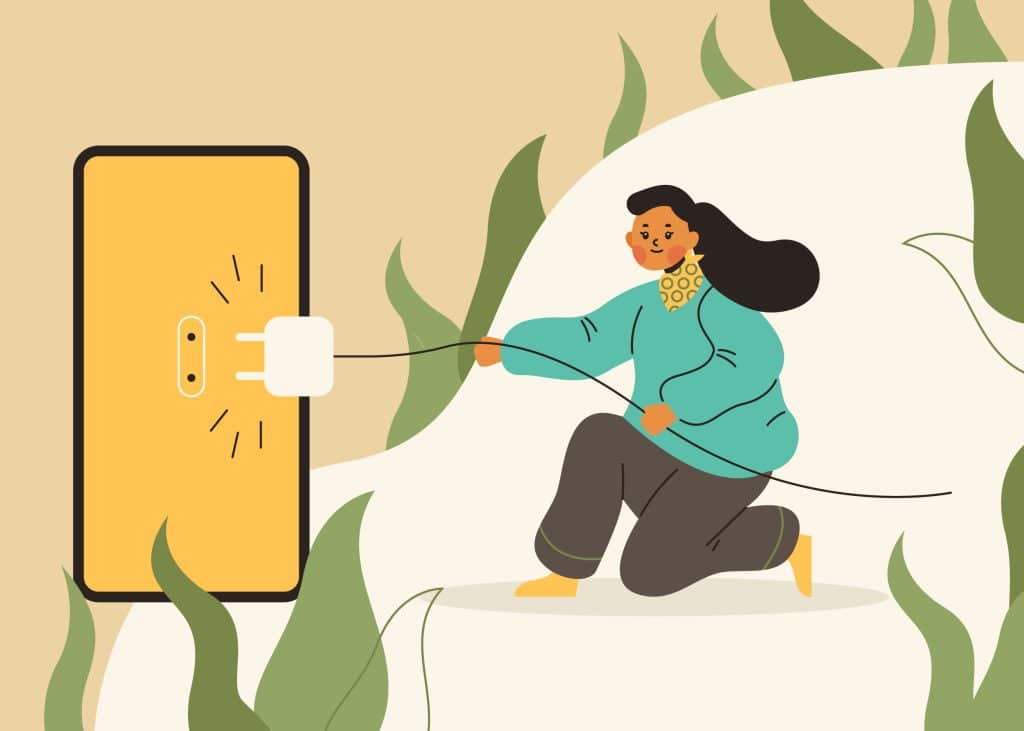In today’s world, we’re more connected than ever, but ironically, it might be our disconnection that holds the key to true focus and productivity. Studies show that our constant digital engagement is often undermining our ability to concentrate and get things done. So, how does disconnecting actually fuel focus? Let’s break it down.

The Paradox of Connectivity
We live in a hyper-connected society, where social media, notifications, and the constant barrage of information from our devices can make us feel like we’re always engaged. Yet, despite this ever-present connectivity, productivity is at an all-time low. Digital distractions, including social media, email, and constant messaging, steal our attention away, breaking the flow state necessary for deep, meaningful work. Disconnecting from these distractions allows the mind to clear, letting us enter a productive, focused mode.
Research on Productivity and Disconnection
In a study by Cal Newport, a professor at Georgetown University and author of Deep Work, Newport explores how disconnection is essential for maximizing cognitive focus. He argues that technology—while enhancing certain aspects of life—often interrupts deep, focused thought and creative work (Newport, 2016). By disconnecting, individuals can better tap into their cognitive potential, achieving more in less time.
Newport’s idea is not just a theory; it is backed by evidence in both scientific research and real-world application. In his book, he highlights examples from companies that have adopted “deep work” philosophies—creating time and space for uninterrupted focus. Their success stories serve as concrete evidence that reducing distractions, especially digital ones, can significantly improve individual and collective productivity.
The Science Behind Disconnection and Focus
Disconnecting is not just a lifestyle choice—it’s also a cognitive strategy that our brains need. Neuroscientific research supports the idea that our brains operate in a “single-task mode” far better than in a “multi-tasking mode.” In fact, multitasking often leads to cognitive overload, diminishing the quality of our work. By disconnecting from the constant stimuli of our devices, we can improve our focus and performance.
The Restorative Effects of Disconnecting
Neuroscientists have found that deep work—focused, uninterrupted work—requires both mental energy and time. Just like our muscles need rest to perform optimally, our brains need “mental downtime.” Disconnecting for short intervals allows our brains to recover, improving memory, decision-making, and creativity. Taking breaks from screens, whether through scheduled digital detoxes or simply turning off devices during work hours, significantly boosts focus.
A study published in Psychology Today explains that when people disconnect from their digital environments, the brain can reset its attention span. It allows for what is called “cognitive offloading,” where the brain does not have to continuously process new, often irrelevant information. This provides more mental energy for complex tasks, such as creative problem-solving and strategy development (Fletcher, 2020).
Disconnecting and Mental Health
Not only does disconnection fuel focus, but it also has restorative effects on mental health. Mental fatigue is a significant consequence of constant digital engagement. Research indicates that digital overload leads to high stress, anxiety, and diminished productivity. Disconnecting allows individuals to recharge their mental batteries and return to their tasks with a fresh perspective. This mental recovery is essential for maintaining focus over time.
Practical Tips: How to Disconnect for Better Focus
If you want to experience the benefits of disconnection, here are a few practical tips to try:
- Scheduled Digital Detoxes: Set specific hours each day when you’ll stay away from screens. This could be during meals, an hour after waking up, or before bed. The key is consistency. Try a detox day on the weekend or dedicate one day a week to “digital silence” to give your mind a break from constant notifications.
- Turn Off Notifications: Disable non-essential notifications on your phone and computer. Constant interruptions can make it harder to stay focused, and reducing these can create a more peaceful, distraction-free environment. You can also use productivity tools that limit access to distracting websites.
- Engage in Offline Activities: Activities like walking, reading a book, or meditating can help your brain switch off from digital noise, allowing you to focus better when you return to work. Physical movement, especially walking, is a great way to reset your focus while boosting creativity.
- Time-Blocking Your Work: Dedicate specific chunks of time to deep work where you avoid checking emails or social media. This allows for uninterrupted focus on one task at a time. You can use techniques like the Pomodoro method, which involves working for 25 minutes and taking a 5-minute break.
- Implement Technology-Free Zones: Create spaces at home or in your office that are completely free of technology. These zones can encourage mindfulness and creativity, fostering better focus. For example, your bedroom should be a place for rest, not work, and your work desk should be free of distractions like smartphones.
Overcoming the Fear of Missing Out (FOMO)
One of the biggest obstacles to disconnection is the fear of missing out. People feel that if they disconnect, they’ll miss important updates, opportunities, or social interactions. However, research shows that taking breaks from digital connectivity actually leads to increased well-being. A study by Harvard Business Review found that employees who took time away from technology were more productive, felt more engaged, and experienced less stress (Harvard Business Review, 2020).
While FOMO is real, we must recognize that it’s often fueled by our overstimulation with online content. Stepping back allows us to rediscover what truly matters in our personal and professional lives. Disconnecting does not mean disconnecting from life—on the contrary, it offers the opportunity to engage more deeply with meaningful tasks and relationships.
Long-Term Benefits of Disconnecting
The long-term benefits of disconnection go beyond just increased focus. People who regularly disconnect report higher levels of happiness and satisfaction. They also experience more meaningful, mindful experiences because they are not overwhelmed by digital distractions. By practicing disconnection regularly, you’re training your brain to function at its best—more focused, more intentional, and more present.
The Future of Work: Disconnection as a Strategy
Looking ahead, more companies and individuals are embracing disconnection as a strategic approach to enhancing focus and well-being. The future of work isn’t about being constantly online but about creating environments where people can disconnect to enhance creativity, productivity, and mental health.
Companies like Basecamp have adopted policies that encourage time offline, with many employees noting that this has improved their overall focus and job satisfaction. It’s clear: embracing disconnection isn’t just a personal choice—it’s becoming an organizational strategy. In fact, remote work policies often focus on structured time for employees to be offline to promote mental recovery and creativity.
Moreover, industries like tech, which often see the highest levels of digital burnout, are beginning to prioritize “mindful tech” design—tools and apps that promote disconnection rather than constant engagement. These developments signal a shift towards a more balanced relationship with technology, one where disconnection is valued as a tool for sustained productivity.
Conclusion
The idea of disconnection fueling focus may seem counterintuitive in a world that prizes constant connectivity, but the evidence is undeniable. Disconnecting isn’t just about avoiding distractions—it’s about allowing your brain to recharge, increasing cognitive capacity, and ultimately improving performance. So, next time you’re feeling overwhelmed by digital noise, consider embracing disconnection. Your focus—and your productivity—will thank you.
References
- Newport, C. (2016). Deep Work: Rules for Focused Success in a Distracted World. Grand Central Publishing. Available at: https://www.calnewport.com (Accessed: 30 July 2025).
- Fletcher, K. (2020). “The Benefits of Disconnecting to Recharge Your Brain.” Psychology Today. Available at: https://www.psychologytoday.com (Accessed: 30 July 2025).
- Harvard Business Review. (2020). “The Productivity Benefits of Disconnecting.” Available at: https://hbr.org (Accessed: 30 July 2025).









